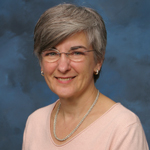Sr. Director and Publisher
 First, tell us a bit about yourself (hometown, current locale, family, hobbies, community involvement?)
First, tell us a bit about yourself (hometown, current locale, family, hobbies, community involvement?)
A Midwesterner to the core, my hometown is Dayton, Ohio, where I grew up in a neighborhood populated by large families with first and second generation European parents – Dutch, Hungarian, and Polish among others. I managed to get as far west as St. Louis for graduate school in the mid-1970s and ultimately settled there in 1981 where I stayed put until a position at the American Society of Clinical Oncology (ASCO) took me to Alexandria, VA from 1986-2013. Although I enjoyed being amidst the bustle of the East coast and all it offers, I have happily returned to my St. Louis home and my husband, George Schelling.
The second oldest of in a family of five sisters and three brothers with siblings scattered from Miami to Seattle and back to Dayton, Cincinnati, and Indianapolis, I am fortunate to have started and continue life with ready-made best friends.
When I am not keeping up with family, I read, cook and entertain friends, walk my neighborhood and parks, listen to music, dabble with growing orchids and gardening a small plot in a community garden and on our balcony, and day dream. Not having traveled much beyond Dayton as a child, I have made up for lost trips in adulthood and this year will have been to Rome, Tuscany, Portugal, Brussels, Prague, Vienna, Frankfurt, Canada, and Carriacou (Grenada).
Describe some of your responsibilities, and how you or your organization fit into the scholarly communications web.
Prior to my retirement from full-time employment at ASCO in July 2013, I was its Sr. Director and Publisher in the journals division. As such I had overall financial and managerial responsibility for Journal of Clinical Oncology (36 issues/year) and Journal of Oncology Practice (6 issues/year) and was ASCO’s key contact for the launch and ongoing operation of The ASCO Post, published by Harborside Press. Both journals are “traditional” peer reviewed, subscription-based publications. Like many US-based medical journals with a multi-year publishing history, JCO is a mature journal with global market penetration, whereas JOP is fewer than 10 years old and appeals largely although not exclusively to the US oncology market.
What career path led to your current position?
Having completed an MA in English at St. Louis University and taught that subject in middle school, high school and college, I moved permanently to St. Louis in 1981 when teaching jobs in language arts at any level were scarce. Through a friend I learned of openings at Mosby and eventually took an editorial assistant position there in the medical book division. I grew restless in that post after a few years, resigned, worked as a free-lance developmental editor, and returned to Mosby a few years later and subsequently held positions in medical and nursing editorial. In 1993 I transferred to the journal division as associate publisher and eventually was promoted to publisher and given additional departmental managerial responsibilities. Following Mosby’s acquisition by Harcourt, I resigned and intended to take a year off work. However, four months later, I joined the Catholic Health Association’s publishing unit with responsibility for a journal, newsletter, and Web site. Lured away in 2001 by Lippincott Williams & Wilkins, I accepted a post as senior publisher charged with acquiring new society business for the journal division. I returned to society journal publishing in 2006 when I joined ASCO as publisher and associate director and was subsequently promoted to senior director and publisher.
Where do you see scholarly communications heading, and what new directions interest you most?
Oh for a crystal ball…. With acknowledged naiveté despite many years in publishing, at times I think journal publishing may be reaching some equilibrium in print vs. online distribution and subscription based vs. open access funding. That is, established journals (particularly those with a degree of print advertising revenue) may well continue dual distribution for the foreseeable future while start-up journals may be available online only depending on subject matter and market preference. Although the financial viability of OA publication may be uncertain, both models co-exist now in the market. On a less optimistic side and perhaps revealing my allegiance to grammar drilled in to me in grade school, I fear an overall decline in the care given to the end product (print or online) as pressure mounts to publish as quickly and inexpensively as possible.
What are some of the surprises/obstacles that you’ve encountered during your career?
The year I stayed at Mosby (by then Mosby Yearbook) after the acquisition by Harcourt was the most difficult one of my career. Among the obstacles were the leadership void and uncertainty about who was in charge of what, the lot of the “acquired” vis-à-vis the “acquiring,” and the loss of my key mentor and professional role model. An ongoing challenge for me has been keeping up with technological developments and their possible or actual application to scholarly publishing.
What advice would you give to people interested in a career in scholarly communications? What new roles or opportunities do you see emerging in the field?
I would advise the following: Accept the challenge of new positions as they become available to you or you seek them out. Don’t be intimidated about moving into and out of book, journal, online publishing; gaining experience across publishing is both interesting and valuable to you and your employers. Never fear saying, “I don’t know. Help me understand.” Address small problems so that they don’t become big ones. Join and participate in professional societies that interest you and are relevant to your career.
Possible new roles or opportunities particularly in or for smaller publishers are a) providing strategic direction for online publishing and b) developing new online products and content for existing products that maximize the medium rather replicating print.

